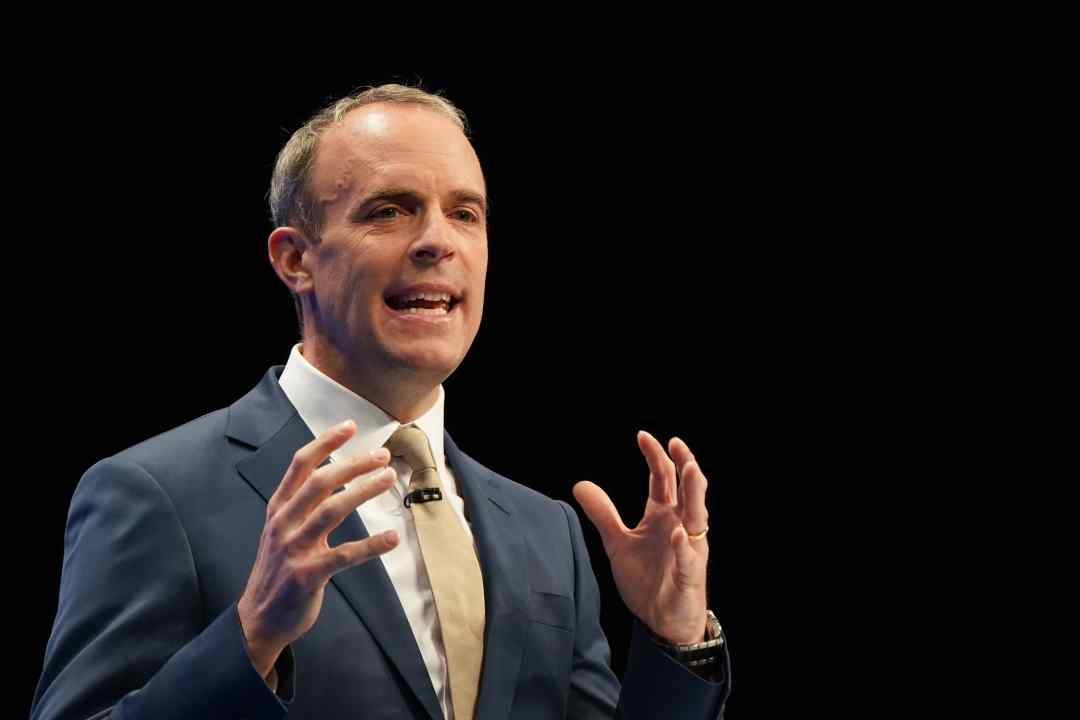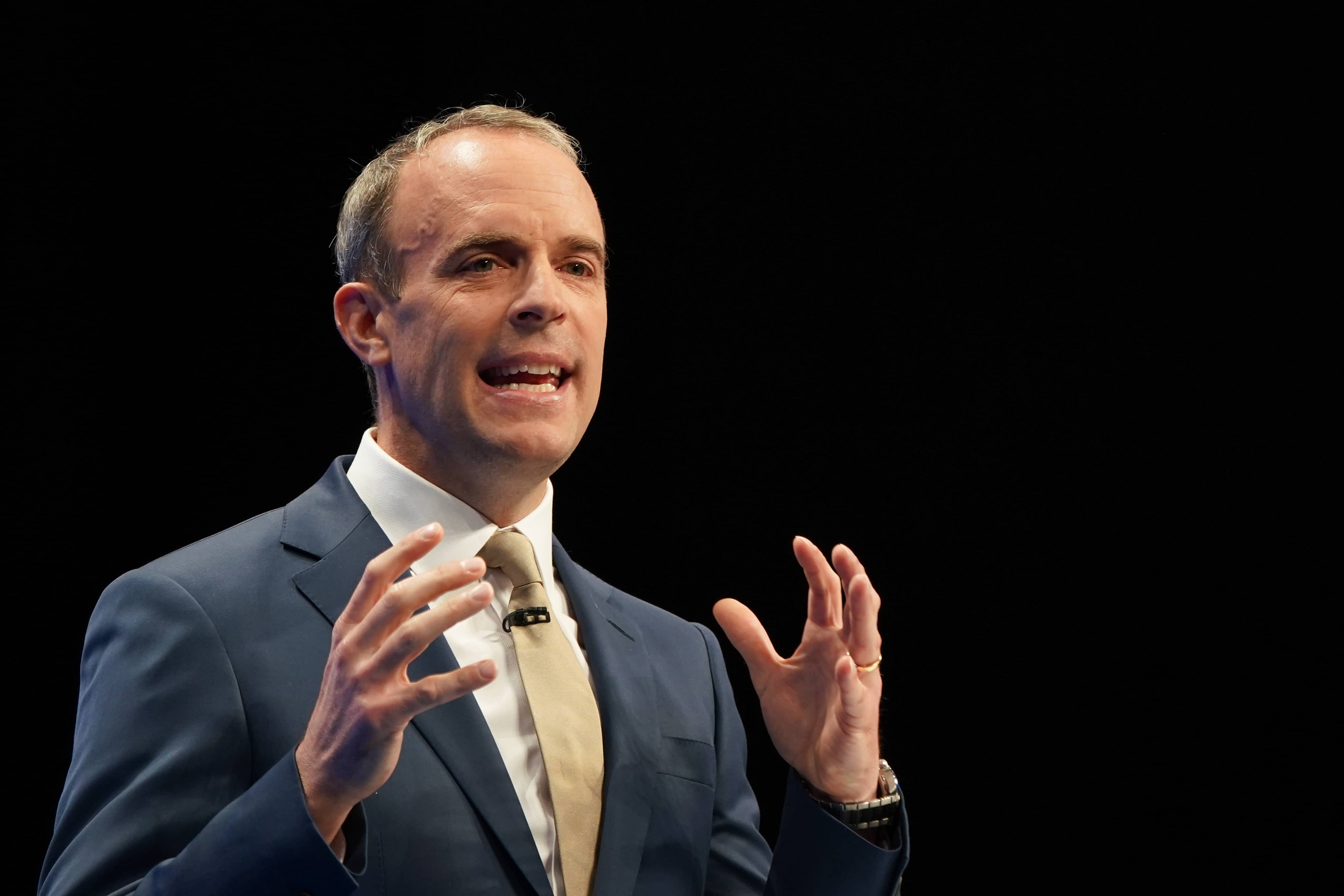How do you solve a problem like Britain’s creaking criminal justice system? To the newly appointed Secretary of State, the answer involves ripping up the Human Rights Act, rolling out more electronic tags for convicts and pumping cash into preventative projects. At a Spectator event this morning, held at Tory Party Conference, Dominic Raab explained that rewriting the UK’s human rights laws was central to his reforming mission. He told editor Fraser Nelson:
The Prime Minister was very clear when he appointed me deputy PM and Justice Secretary that he wanted this done… Overhauling the Human Rights Act is not just a good way of dealing with the foreign nationals that we can’t deport but also of ironing out our constitution.
Freedom of speech, that ‘quintessentially British liberty’, has been eroded by political correctness, according to Raab. His reforms, he explained, would see its protection restored while also enforcing separation of powers and bolstering the prerogative powers of parliament. It’s not the first time Raab has looked at reforming the UK’s human rights laws. Under David Cameron, the former lawyer was tasked with setting out an alternative British Bill of Rights. Cameron bottled it. Now Boris Johnson wants to see those plans revived.
Freedom of speech, that ‘quintessentially British liberty’, has been eroded by political correctness
But what of the immediate problem, the huge backlog in criminal cases that are clogging up the courts? Raab admitted that it would take him six months to a year just to get the criminal justice system back up to pre-pandemic levels of efficiency (even before Covid there was a backlog of 39,000 cases — in June that number stood at 60,000). Raab told the event: ‘The magistrates’ courts cases are coming down, the crown court cases are flatlining… Of course it’s gummed up the system, but we are absolutely on top of it.’ Part of his plan involves publishing scorecards for different parts of the criminal justice system, ranking police forces, prosecutors and the courts.
One of his commitments this conference has been to introduce an extra 10,000 electronic tags for burglars and robbers released back into the community, as well as 12,000 tags that can test blood alcohol levels in the hope that they can cut crime and health costs. But one questioner asked about measures for preventing anti-social behaviour in the first place. Raab said he was keen on the idea of departments like Health and the Home Office creating a shared pot of cash to pump into schemes that can keep youngsters out of trouble. The judo black belt said that martial arts clubs have proven an effective route for keeping teenagers out of gangs.
Fraser asked the deputy PM whether he might consider offering clemency to those 3,000 licence fee dodgers who find themselves in court each week as a way of freeing up resources. Raab smiled at the prospect, telling the audience that it was ‘an attractive idea’ and promising to speak to the new Culture Secretary Nadine Dorries about it.
The Esher and Walton MP, a committed Brexiteer, focused too on migration. Petrol and food shortages, caused by a lack of HGV drivers, have been too readily blamed on Brexit, he said. The answer to a labour shortage is for employers to pay more. Supply issues, he suggested, are a necessary pre-condition of achieving ‘a high wage, high employment, low reliance on cheap labour from abroad paradigm’. Employers should also look at hiring ex-convicts as a way of both plugging the gaps in the labour market and helping reduce the rate of reoffending.
Raab was challenged by another questioner who argued that restricting the ability of businesses to hire abroad was the opposite of a free-market policy. But the former foreign secretary was quick to point to the US and Australia, both free-market economies which have strict immigration policies. He explained: ‘During the referendum, one of the seminal moments was when Lord Rose, the former head of M&S, said that the problem with Brexit was that labour costs would go up — every working-class voter in this country heard that a wage rise was coming their way.’
He also defended the government record in bringing in refugees from Afghanistan, a crisis that many saw as contributing to his demotion from Foreign Secretary. He explained: ‘We’re not going to be able to take them all, Fraser, but I think the right thing is to go about it the way we have… we’ve done three or five times more than any other European country.’
Raab’s move to Justice may well be seen as a demotion, but there was little sign of discord from the 47-year-old towards the top team in Downing Street. One crowd-member referred to him as Chancellor. ‘It’s Lord Chancellor,’ he replied, ‘I don’t want to give Rishi the heebie-jeebies.’







Comments